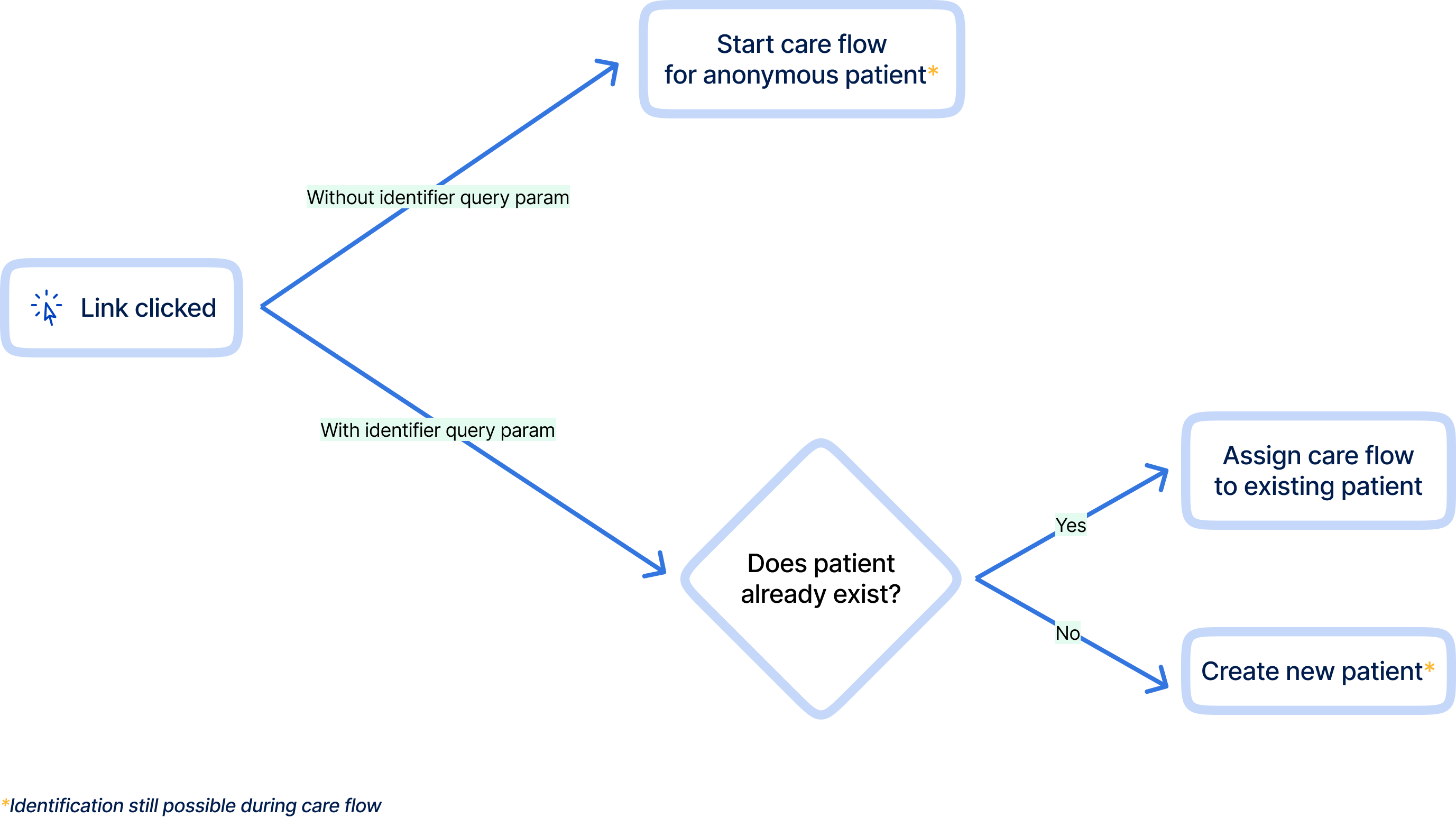Trigger types
Awell Hosted Pages Link
Let patients and care team members start care flows simply by clicking a link
Awell can generate a shareable link for your published care flow that, upon clicking, starts a care flow and immediately returns a URL to Awell Hosted Pages so the user who clicked the link can immediately interact with their activities.
This trigger is perfect when:
- You want patients to be able to self-enroll in a care flow. E.g. start an intake or onboarding flow upon clicking a button on your website or in your app.
- Since a patient initiates the trigger by clicking a link, there will be an instant feedback mechanism where Hosted Pages will be displayed to the user, enabling them to immediately complete their activities.
How to
Hosted Pages Link
In Awell Studio, you can generate a shareable Hosted Pages Link which, upon clicking, starts a care flow and navigates the user who clicked the link to Awell Hosted Pages. Learn more here.
The link can also be downloaded as a QR code. Patients can start a care flow easily by scanning the code using their mobile device.
Get your shareable link
Session
You can use this mutation to programmatically start a care flow and immediately create a session with just a single API call.
The concept is to invoke this mutation when a user clicks a button or link. This mutation will then provide a session_url to which you can redirect the user.
Sessions and Hosted Pages Links
Learn more about Sessions and Hosted Pages Links here.
Associate a patient with your care flow
When using the default shareable Hosted Pages Link, a care flow is started and assigned to an anonymous patient profile in Awell. However, usually you'd want to ensure that these care flows can be connected back to a specific patient profile in Awell, so you can match them with a patient in your own system.
Sharing PHI with Awell
Please note that you have full control over how much PHI or demographic data you choose to share with Awell. We are equipped to manage care flows even for patients who remain anonymous. The specific details you need to provide largely depend on the design ofyour care flow.
For example, if your care flow incorporates conditional logic based on the patient's sex and birth date, then these details must be shared with (or captured by) Awell. Additionally, we advise including at least one identifier to ensure that a patient profile in Awell can be matched with a patient in your own system.
Query string
If the link is clicked within a context where the patient's identity is already established (e.g. patient is logged into your app), the identity of the patient is known. In such cases, we enable you to append an identifier to the link, indicating which specific patient the care flow should be started for.
01
The query string is part of the URL, and its components need to be url-safe. Characters list spaces, ampersands, and others cannot appear in URLs, and so need to be escaped. If you're generating the URL to redirect to in javascript, make sure to use the
encodeURIComponent() method for encoding your query parameter. Similar functions exist for other languages.
When the link is clicked, Awell verifies whether a patient with the provided identifier already exists. If a patient with that identifier is found, the care flow is started for this existing patient. If there is no matching patient, Awell creates a new patient profile and immediately assigns the identifier to this new profile.
Query parameters
We only allow identifiers in URL query parameters for security reasons; passing any other patient data (PHI) is not permitted. Consequently, when using the shareable link, you are limited to passing only an identifier. This limitation is particularly relevant when a patient profile does not yet exist in Awell, as no additional patient data can be passed through the link. Moreover, passing baseline is also not supported via the shareable link.
If you would like to use the shareable Hosted Pages link and require additional flexibility to submit either patient profile data or baseline information, the following options are available to you (read more below):
| Option | Supports baseline info | Supports patient identification |
|---|---|---|
| Sessions | ||
| Identify patient in care flow |
In summary, for handling especially sensitive data, we suggest using Sessions or safely identify a patient during the care flow, as detailed below.
Sessions
If you want more control over the patient creation process, the data you'd like to pass about a patient when they don't exist yet, or have baseline information in your care flow, the use of Sessions is recommended, as it offers complete control over these aspects.
Given that Sessions are created programmatically via Awell's API, it is possible to safely search for, create, and update patient profiles, as well as input baseline information, before starting the Hosted Pages session through the API.
Use cases
- A patient clicks a button on your website or app to start an onboarding flow
- A patient can self-enroll in a self-help care flow via your website or app
- Let patients scan a QR code in the waiting room to complete a pre-visit intake
- Send a link over email to your patient population

